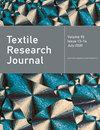Study on the relationship between blending uniformity and yarn performance of blended yarn
IF 1.9
4区 工程技术
Q2 MATERIALS SCIENCE, TEXTILES
引用次数: 0
Abstract
The performance of blended yarns is affected by the distribution of component fibers within blended yarn and the blending uniformity. However, there is a lack of comprehensive and quantitative investigations on the relationship between them. In this paper, various specifications for two-component blended yarns were prepared, and the main factors affecting blending uniformity were analyzed. Then the yarn blending irregularity and yarn performance, including tenacity, tenacity coefficient of variation, extension and yarn unevenness were tested. Finally, Pearson correlation analysis and linear regression were performed between blending irregularity and each yarn performance to characterize the influence of blending uniformity on yarn performance quantitatively. The results show that the blending irregularity is effectively improved by uniform feeding of slivers, and increasing the passage of sliver blending. The blending irregularity has no significant influence on the relationship between twist factor and yarn performance. The blending irregularity has the most positive and highest effect on tenacity coefficient of variation, followed by tenacity and unevenness in third place, and the Pearson correlation coefficient ( P) were all above 0.5, and the linear regression coefficient was above 10混纺纱混纺均匀度与纱线性能关系的研究
混纺纱的性能受混纺纱中组分纤维的分布和混纺均匀性的影响。然而,目前还缺乏对它们之间关系的全面定量研究。本文编制了双组分混纺纱的各种规格,并分析了影响混纺均匀度的主要因素。然后测试了纱线混纺不均匀度和纱线性能,包括韧性、韧性变异系数、延伸率和纱线不匀度。最后,在掺纱不均匀度和各项纱线性能之间进行了皮尔逊相关分析和线性回归,以定量分析掺纱不均匀度对纱线性能的影响。结果表明,通过均匀喂入棉条和增加棉条掺混段数,可有效改善掺混不均匀度。掺混不均匀度对捻度系数和纱线性能之间的关系没有显著影响。掺混不均匀度对韧度变异系数的正向影响最大,排在第三位的是韧度和不匀,皮尔逊相关系数(P)均在 0.5 以上,线性回归系数在 10-3 以上,但断裂伸长最弱,与掺混不均匀度呈负相关。除断裂伸长外,当纤维线密度和纤维长度差异较大时,混棉不均匀度对纱线性能的影响更为明显。本文揭示了混纺均匀度与纱线性能之间的关系,为混纺纱线性能的理论研究提供了依据。
本文章由计算机程序翻译,如有差异,请以英文原文为准。
求助全文
约1分钟内获得全文
求助全文
来源期刊

Textile Research Journal
工程技术-材料科学:纺织
CiteScore
4.00
自引率
21.70%
发文量
309
审稿时长
1.5 months
期刊介绍:
The Textile Research Journal is the leading peer reviewed Journal for textile research. It is devoted to the dissemination of fundamental, theoretical and applied scientific knowledge in materials, chemistry, manufacture and system sciences related to fibers, fibrous assemblies and textiles. The Journal serves authors and subscribers worldwide, and it is selective in accepting contributions on the basis of merit, novelty and originality.
 求助内容:
求助内容: 应助结果提醒方式:
应助结果提醒方式:


